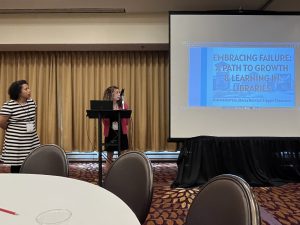Jun
03

Posted by liaison on June 3rd, 2024
Posted in: #CC/Academic List, Funding
This is a guest post written by funding awardee, Maggie Shawcross. She used NNLM Region 4 professional development funds to attend the LOEX National Conference in Naperville, Illinois last month.
Just as you start getting comfortable, things change. That is my story. I was hired as a Health Sciences Librarian at the University of Northern Colorado in 2019. After three years of teaching one-shots and doing one-on-one consults, I finally felt completely comfortable navigating students through the research process needed and resources available for in-depth health science research. Then, my job responsibilities changed, and instruction was added to my list of job duties.
Most of my experience with library instruction had me teaching students in a one-on-one session or me teaching as part of a class lesson about library services for anywhere from 10 to 75 minutes. My experience with students either had me giving students a very personalized research session or a very short, general introduction to the library to a large audience. Teaching a course, where I discuss library research for one hour, three times a week for over eight weeks would be much different than what I was used to. My supervisor steered me towards some very helpful books and webinars but learning how to teach a credit course seemed a bit daunting to me. She then suggested I look into attending the LOEX Conference.
The LOEX Conference, which used to stand for Library Orientation Exchange, is an annual conference dedicated to instruction and information literacy. This is small conference, with only 200 attendees. I was able to attend in 2023 and in 2024 put in a presentation proposal and it was accepted. I had expected to use my yearly professional development funds to pay for my attendance. Unfortunately, my funding was taken as a cost cutting measure. I then remembered as a member of the Network of the National Library of Medicine, I could apply for professional development funds!
I applied and was awarded funds to attend and to present at LOEX. I was happy that I was able to attend the conference in person and to get to share my presentation to other librarians. Also, there were some great presentations on a variety of topics that would be of interest to librarians that teach. Artificial intelligence, addressing misinformation, and outreach and engagement topics were prominent at this year’s conference. One session, Teaching Graduate Students How to Read and Critically Consume Systematic Reviews, seemed very interesting. This session served to introduce librarians, who are new to using systematic reviews for research, to helping students evaluate systematic reviews. The session, who was developed based on their experience working with education students, approached systematic reviews differently than I would with my health science students. They created a form that forces students to evaluate the validity and credibility of the article. I’d like to modify this form and use it with my students. Another session, Let’s ChatGPT: Incorporating Generative AI in Information Literacy Instruction, got me thinking about how we could possibly use generative AI in answering students reference questions through chat, after hours. Would it be possible to generative AI to help guide a student through developing a research question and pulling keywords for searching? I don’t know, but I’d like to look further into this.
My presentation was titled Embracing Failure: A Path for Growing and Learning in Libraries. My copresenters and I wanted participants to leave our session with tools to help them reframe their negative feelings about failure. As a newer instruction librarian, I felt I was failing all the time. My more experienced colleagues shared some tools that helped them get through such disappointment. Some tool that we suggested were journaling and teaching in a manner that’s genuine to you. Several participants said that they appreciated being given the opportunity to talk about failure in a safe environment. This reminded me that we need to provide more support to all library workers and create spaces where failure can be spoken about openly to be able to address and fix issues.
wanted participants to leave our session with tools to help them reframe their negative feelings about failure. As a newer instruction librarian, I felt I was failing all the time. My more experienced colleagues shared some tools that helped them get through such disappointment. Some tool that we suggested were journaling and teaching in a manner that’s genuine to you. Several participants said that they appreciated being given the opportunity to talk about failure in a safe environment. This reminded me that we need to provide more support to all library workers and create spaces where failure can be spoken about openly to be able to address and fix issues.
Overall, this was a great conference and I would recommend it to any librarian who does instruction (one-on-one consultations), one-shots/integrated instruction or course instruction. I am grateful to have access to these funds as they allowed me to attend, present and network at this conference. I left with some ideas on how to better serve my health science students and connected with other librarians, in hopes of future collaborations.
——————————————————————————–
If you are interested in obtaining funding for professional development, we are currently accepting applications for Year 4. Applications accepted and awarded on a rolling basis until February 16, 2025 at 5:00 pm MT or when the funds are depleted.
Please reach out to your state’s point of contact with any questions you may have.